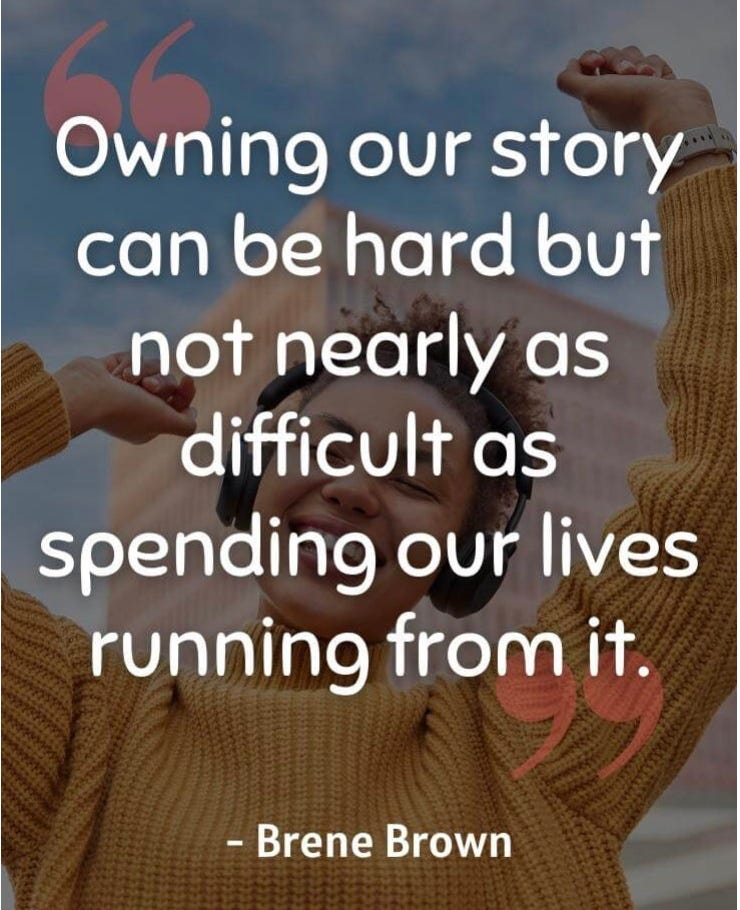“We must be willing to let go of the life we planned so as to have the life that is waiting for us.”
― Joseph Campbell
This week, I’m continuing my look back at the beginning of The Power of Change. As I approach the first anniversary of the launch on Substack, I’m revisiting the importance of resilience and its role in one’s life.
I’m dedicating one post a month to the topic under the header Chronically Well. While my resilience results from learning to live with a chronic illness, the subject of resilience and the strategies to build it apply to anyone.
My first post in October 2022 outlined five steps I took to build resilience and overcome adversity. Last month, I wrote about the First Step: Acceptance. If you missed that post, you can read it here.
Today’s topic is the Second Step: Becoming Self-Aware
Becoming Self Aware
My regular readers know I have two chronic health conditions that affect me daily. That hasn’t changed.
But what has changed is my ability to enjoy life and live well despite my symptoms and limitations.
During the past twenty years, I became a student of change. I learned to change my mindset and perspective on life and use both to my advantage.
I began to live chronically well.
I think we build resilience to prepare for whatever adversity we’ll face. And we all face some adversity - we’re all living some form of Option B.
-Sheryl Sandberg
Sheryl Sandberg, author of the bestsellers Lean In: Women, Work, and the Will to Lead and Lean In for Graduates, is a former economist at the World Bank, chief of staff to U.S. Treasury Secretary Larry Summers, and COO of Facebook. She has said we build resilience to prepare for whatever adversity we face, yet I believe we build resilience because of the adversity we face.
I don’t know many who set out to build resilience for the challenges that may come in the future, but I know many who developed and demonstrated resilience due to the adversity they faced.
Life presents us all with challenges. Most of us have or will experience traumatic events such as the sudden death of a loved one, a debilitating disease, financial loss or insecurity, or a natural disaster.
What differentiates us is how we respond to these events.
At 26, when I could not do the job I loved because of my health, I felt utter despair. Simple things, like reading the newspaper, became difficult due to brain fog. My ability to communicate, always a strength, became a chore. I could no longer write articles, speeches, or press releases. I struggled to write a list of my symptoms in a journal.
The bone-crushing fatigue and daily fevers further drained me emotionally and physically.
I withdrew from life because it was easier than watching the life I knew disappear in front of my eyes.
But in time, I realized there was no escape, and the only way forward was through it. Because everything about me changed, I began reevaluating who I was.
What is Self-awareness?
Self-awareness is your ability to perceive and understand what makes you who you are, including your personality, actions, values, beliefs, emotions, and thoughts. If you’re highly self-aware, you can objectively evaluate yourself, manage your emotions, align your behavior with your values, and understand how others perceive you.
During the first years of my illness, everything about me changed except my values…my personality, actions, emotions, and thoughts. I knew other’s perceptions had changed as well, but instead of worrying about how others saw me (sick, reserved, withdrawn), I focused on the parts of me that hadn’t changed while acknowledging my new limitations.
I developed a sense of self-awareness that aligned with my life.
I started by allowing myself to feel every emotion that accompanied the many losses I experienced. I couldn’t push the pain and fear away any longer. I accepted it and talked about it.
Learning to know the new me enabled me to get in tune with my body and mind. Meditation and mindfulness were a big part of this phase.
I reassessed my thoughts and emotions and tuned in to what they told me. I rested when I couldn’t lift my head off the pillow. I pushed myself when I was able. In the process, I came to fully understand who I was becoming. I recognized my strengths and challenges, learned to trust my decisions, and listened to my intuition.
When I met a medical provider who dismissed me or my condition, I erased him from my list and looked elsewhere.
I slowly regained confidence that I would persevere. I developed a growth mindset and focused on the future.
Learning to accept my situation was the first step in building resilience.
Becoming self-aware was the second step.
Today, I can still accurately decipher my body temperature without a thermometer, and my intuition is a loud voice that cannot be silenced. I can objectively evaluate myself and manage the limitations that are a part of my chronic illness.
I didn’t plan to build resilience in anticipation of life’s challenges, but I developed it due to my circumstances. Through patience and practice, I learned to adapt to difficult life experiences and become stronger, more grateful, and happier.
Look for Step Three in the next edition of Chronically Well. In the meantime, I’d love to know if you think about resilience or have developed it due to a challenging life event. What steps did you take?
This edition of Soulful Sunday is free for everyone. I send this email weekly on Sunday mornings. If you’d like to receive it, subscribe and join the growing community at The Power of Change.
If you enjoyed this post, please share it with friends and click the ❤️ button below so more people can discover it on Substack.🙏🏻






Definitely learning to be my own story. There are days when I sink into pain, when I don’t fight it, well it is much easier to rise above it faster. I so appreciate what you share here.